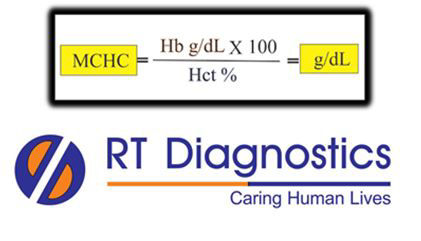# MCHC
Physicians use this information from the CBC to calculate MCH (Mean corpuscular hemoglobin) and also MCHC (Mean corpuscular hemoglobin concentration – to detect the average amount of HB in RBCs). This information helps in the diagnosis of anemia. High MCHC levels are usually seen as a sign of macrocytic anemia due to insufficient folic acid or vitamin B12. High MCHC can also be due to liver diseases. Low MCHC levels are usually seen when RBCs do not have much hemoglobin, conditions like hemolysis, Crohn’s disease, peptic ulcer, gastric bypass surgery, etc.
MCHC TEST:
MCHC- Mean Corpuscular Haemoglobin Concentration
This Test evaluates the mean hemoglobin concentration level of single Red Blood Cells. This is one of the tests in a Complete Blood Count (CBC) Profile. This test helps to detect anemic health conditions. This test is taken along with MCV (Mean Corpuscular Volume) and MCH (Mean Corpuscular Haemoglobin) test.
CLINICAL INFORMATION :
This test is usually done for high or low MCHC: - Usually, patients with symptoms such as fatigue, jaundice, weakness, enlarged spleen, fainting, etc., leads the physician in suspicion with high MCHC levels associated with macrocytic anemia, hereditary spherocytosis, severe burns, liver disease, overactive thyroid, and medications. Patients with symptoms like fatigue and chronic tiredness, shortness of breath, pale skin, easy bruising, dizziness, weakness or loss of stamina, etc., leads the physician in suspicion with microcytic anemia (lack of iron as in cases with celiac disease, Crohn’s disease or gastric bypass surgery, hemolysis, parasitic infections like hookworms, lead poisoning chronic low-grade blood loss over a long period of time due to peptic ulcers or abnormal menstrual bleedings and/or certain type of cancers). This test is suggested in patients with symptoms of anemia, fatigue, palpitations, shortness of breath, chest pain, weakness, headache, etc. Other associated tests include micronutrient tests like vitamin B12, D, E, magnesium, copper, selenium, and zinc, etc.

General instructions:
Sample Requirement: Specimen - Blood sample drawn from the vein. Test Preparation: None.
NOTE - Sample for specimen collections may vary based on the patient’s condition/cases according to the patient’s presenting complaints/signs or symptoms:
SPECIMEN REQUIREMENT (Special or Rare Cases) - As instructed and guided by Physician / Clinician / Pathologist / as per Laboratory’s requirements, according to procedures and protocols.
This Multi-Specialty Clinical Referral Laboratory “RTDIAGNOSTICS” provides precise and accurate tests with an extensive range of testing services to the medical centers to help in the diagnosis and identification of pathology in the test specimens for infectious diseases and also to evaluate the function of organ systems of the patient. It prevents further complications and helps to stabilize and restore health to near normalcy at the earliest without delay.



